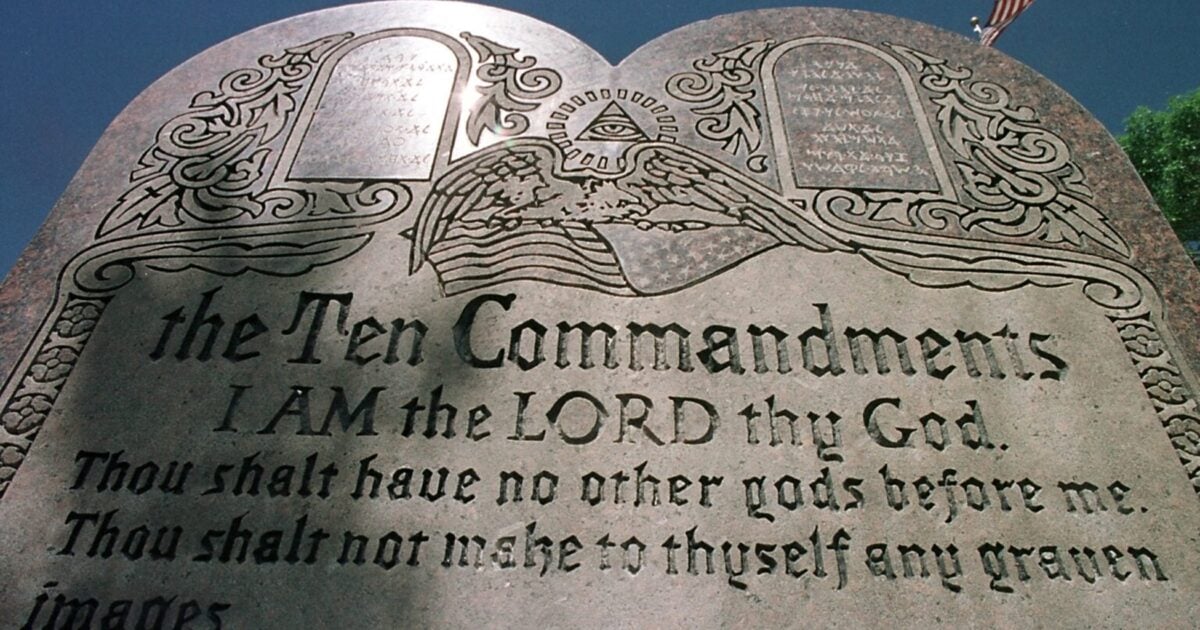Louisiana has passed a law, H.B. 71, requiring the display of the Ten Commandments in every public school classroom, making it the first state to do so.
The law, signed by GOP Governor Jeff Landry, specifies that a poster-sized display of the Ten Commandments in “large, easily readable font” must be shown in all public classrooms, including K-12 education and state-funded universities like LSU.
Each display will also be accompanied by a four-paragraph “context statement” explaining the historical significance of the commandments in American public education for almost three centuries.
The law mandates that these displays must be in place by the start of 2025 and requires that they be paid for through donations rather than state funds.
This move has sparked controversy and is likely just the beginning of a larger debate.
Lawmakers in Texas, Utah, and Oklahoma have put forward proposals to mandate legislation akin to Louisiana’s.
However, concerns about potential lawsuits have hindered the adoption of these measures into state law.
According to the BBC, there have been numerous legal disputes over the display of the Ten Commandments in public facilities such as schools, courthouses, and police stations.
H.B. 71 also permits the exhibition of the Mayflower Compact, the Declaration of Independence, and the Northwest Ordinance in K-12 public schools.
Unlike the Ten Commandments, however, these displays are not obligatory.
As expected, far-left opponents such as the American Civil Liberties Union (ACLU) have vowed to fight the law tooth and nail in court. The ACLU announced Wednesday they have partnered with the anti-religion groups Americans United for Separation of Church and State and the Freedom from Religion Foundation to file a lawsuit challenging the new Louisiana legislation.
“We are preparing a lawsuit to challenge H.B. 71,” the groups wrote. “The law violates the separation of church and state and is blatantly unconstitutional.”
“The First Amendment promises that we all get to decide for ourselves what religious beliefs, if any, to hold and practice, without pressure from the government,” the statement continues. “Politicians have no business imposing their preferred religious doctrine on students and families in public schools.”
From a legal standpoint, it is uncertain which group has the advantage. On one side, the ACLU and its allies have favorable historical precedents from previous Supreme Court decisions.
The Associated Press reports that a similar law in Kentucky was deemed unconstitutional back in 1980.
The Court, with a 5-4 vote, ruled that the Kentucky law violated the establishment clause of the U.S. Constitution, which prohibits Congress from making laws respecting an establishment of religion.
In their ruling, the justices pointed out that apart from criminal matters, the Ten Commandments also contained references to worshipping God.
Nevertheless, Louisiana might still have a chance if the Supreme Court eventually reviews the new law. Currently, Republicans hold a 6-3 majority on the Court, with three justices appointed by Trump.
This Court has already overturned several precedents, including Roe vs. Wade. Disregarding the potential for a significant decision on religion could be unwise.
ICYMI: Iowa poll shows Trump’s support marginally increased after New York conviction

